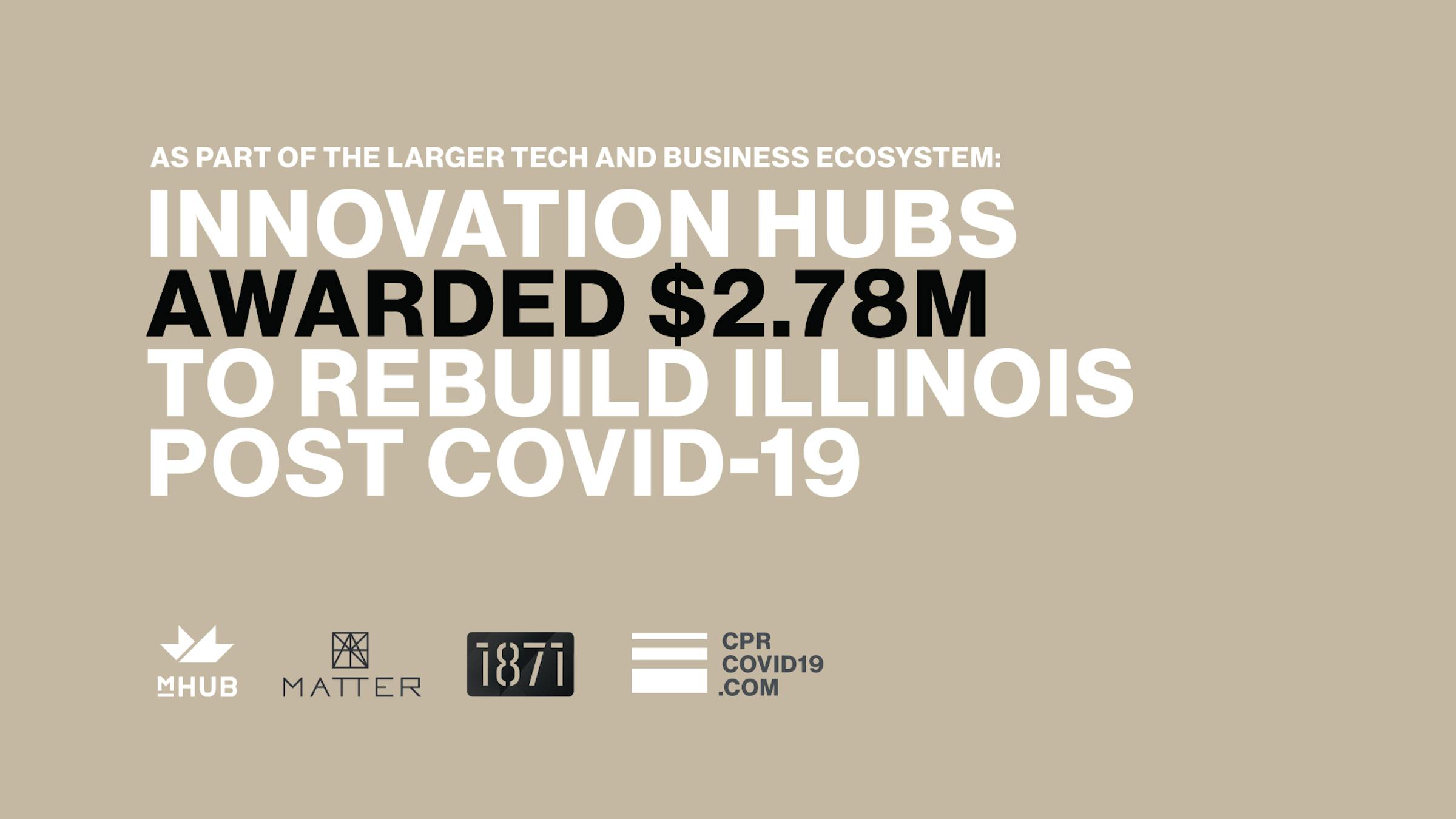mHUB, MATTER and 1871 secure $2.78M federal grant to rebuild Illinois economy post-COVID-19 through tech and manufacturing innovation
The U.S. Economic Development Administration has awarded a $2.78M grant to the Chicago Proactive Response (CPR) COVID-19 collaboration, a two-phase mobilization of Chicago’s innovation communities
May 27, Chicago, IL — Chicago’s leading innovation centers, mHUB, MATTER and 1871, secure a $2.78M federal grant from the U.S. Economic Development Administration (EDA) to invigorate startups and small businesses through their Chicago Proactive Response (CPR) COVID-19 initiative.
Now entering Phase Two, the collaboration will support startups and small businesses as they build a road to economic recovery through wealth and job creation. With the grant funding, the number of startups currently supported by mHUB, MATTER and 1871 is projected to grow from 1,000 to 1,325, resulting in over 10,000 direct and indirect jobs created over the next 10 years.
Tenets of the program include a continuous learning system for entrepreneurial training, small business digitization support, technical and prototyping support for hardtech innovation, a regional manufacturing and business services supplier network, and entrepreneurial development programs that support regional economic recovery as Illinois rebuilds. All facets of the initiative are anchored by a commitment to support under-resourced businesses and narrow the equity gap for female founders and entrepreneurs of color across Chicago and the larger state of Illinois.
“Over the past three decades, startups have been the driving force of net job creation for the US economy, alongside growing small and medium-sized businesses. While COVID-19 has presented enormous challenges for entrepreneurs and business leaders, they will be the ones to steer Chicago’s economic recovery. We are very thankful to the EDA whose grant allows us to scale our collective resources to accelerate the growth and resiliency of startups and small businesses across Illinois,” said Haven Allen, chief executive officer and co-founder of mHUB, Steven Collens, chief executive officer of MATTER and Betsy Ziegler, chief executive officer of 1871 in a collective statement.
“As we continue to grapple with the economic challenges of the COVID-19 pandemic, we must ensure that small businesses and startups are not left behind,” said U.S. Senator Dick Durbin (D-IL). “This federal funding will allow mHUB, MATTER, and 1871 to continue creating jobs and fostering innovation. I’ll continue supporting their work and advocating for federal resources to help families and small businesses during this unprecedented crisis.”
“This federal investment provides an important opportunity to help create a more inclusive and equitable environment for minority and underrepresented entrepreneurs, and I’ll keep advocating for the resources these communities need in order to grow and thrive,” said U.S. Senator Tammy Duckworth (D-IL).
“The CPR initiative has created a pathway for our world-class innovation centers, 1871, MATTER and mHUB, to provide tech businesses with the tools they need to face the burdens created by COVID-19,” said Illinois Governor JB Pritzker. “Thank you to the EDA for investing in programming that will build resiliency among small and medium sized businesses and entrepreneurs and allow for continued growth and innovation among key industry sectors of IT, healthcare and manufacturing, to name a few. This type of cross sector, statewide collaboration underscores the comprehensive response my administration has prioritized from day one, and will remain essential in the days ahead as we continue fighting to protect our communities from the virus, revitalize major industries, and build back our Illinois economy.”
“Addressing the impact of COVID-19 on our local economies will need to include a community-wide effort,” said Dorri McWhorter, Chief Executive Officer of YWCA Metropolitan Chicago. “I fully support the collaborative effort led by mHUB, MATTER and 1871 to energize small businesses and startups on the road to economic recovery. We must work together, and across all of Chicago, as we move past this difficult economic challenge toward a better tomorrow.”
The CPR COVID-19 Phase One Impact
Phase One of CPR COVID-19 mobilized Chicago’s healthcare and tech communities to provide a swift response to the COVID-19 crisis. In six months, the collaboration between Chicago’s innovation centers identified over 300 technology ventures with relevant solutions and helped them connect with state, city and healthcare officials to deploy. In addition, volunteers contributed more than 4,500 hours to the production of vital PPE, respirators, ventilators and sterilization solutions, resulting in the donation of more than 14,000 face shields to Chicago’s hospitals, clinics and other front-line businesses, many in underserved communities. mHUB, MATTER and 1871 provided 1,669 free months of membership to entrepreneurs who were financially affected by COVID-19 or who were working specifically on solutions that could have immediate benefit. Phase One was made possible by the generous support of the Searle Funds at the Chicago Community Trust as well as the Walder Foundation and Bank of America.
The Broader Ecosystem for Economic Recovery
More than 50 companies, community organizations and public officials wrote letters to the EDA supporting the application of mHUB, MATTER and 1871. The EDA funding is part of a larger effort to increase collaboration across Illinois’ technology and business community to advance economic recovery, and mHUB, MATTER and 1871 welcome additional community organizations to join us in our mission.
More information can be found at CPRCOVID19.com
About mHUB
mHUB is a leading independent hardtech and manufacturing innovation center that exists to convene the entrepreneurial ecosystem around physical product innovation to ensure that the manufacturing industry continues to accelerate, grow and thrive. The mHUB community includes over 428 active and alumni startups and small businesses supported by a deep talent pool of product designers and developers, entrepreneurs, engineers and manufacturers, corporate leaders, industry experts, mentors and investors. mHUB provides a hyper-resourced environment to entrepreneurs with the goal of commercializing new hardtech innovation that will lead to new businesses, intellectual property, investment, revenue and job creation. Since launching in 2017, the mHUB community has generated more than $430M in revenue, launched more than 1,256 products, hired more than 2,153 employees, and raised nearly $702M in capital. For more information go to www.mhubchicago.com.
About MATTER
MATTER, the premier healthcare incubator and innovation hub, includes hundreds of cutting-edge startups from around the world, working together with dozens of hospitals and health systems, universities and industry-leading companies to build the future of healthcare. Together, the MATTER community is accelerating innovation, advancing care and improving lives. Since its inception in 2015, MATTER has supported more than 500 cutting-edge healthcare technology startups from around the world that have created more than 6,000 jobs and raised more than $1.7 billion in capital. Their products have been used by more than 1 million clinicians and have benefitted more than 311 million patients. For more information, visit matter.health and follow @MATTERhealth.
About 1871
1871 is Chicago’s technology hub and the #1 ranked private business incubator in the world. It exists to inspire, equip, and support founders, growth-scalers and innovators in building extraordinary businesses. 1871 is home to ~450 technology startups, ~400+ growth stage companies, and ~1,500 members, and is supported by an entire ecosystem focused on accelerating their growth and creating jobs in the Chicagoland area. The member experience includes virtual and in person access to workshops, events, mentorship, and more. The nonprofit organization has 350 mentors available to its members, alongside access to more than 100 partner corporations, universities, education programs, accelerators, venture funds and others. Since its inception in 2012, more than 650 alumni companies are currently still active, have created over 11,000 jobs, and have raised more than $1.6 billion in follow-on capital.



